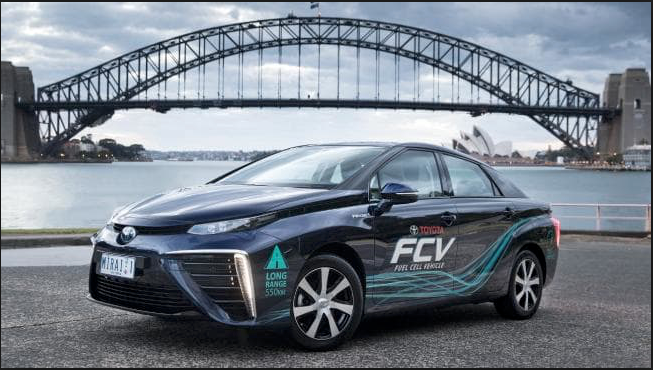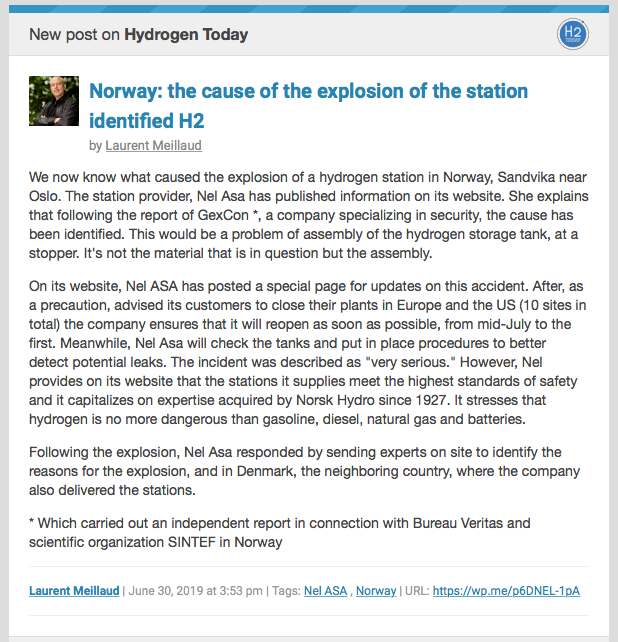 "pip bip - choose Corrour" (hhgttg69)
"pip bip - choose Corrour" (hhgttg69)
07/01/2019 at 09:14 ē Filed to: hydrogen today, hydrogen, toyota
 1
1
 4
4
 "pip bip - choose Corrour" (hhgttg69)
"pip bip - choose Corrour" (hhgttg69)
07/01/2019 at 09:14 ē Filed to: hydrogen today, hydrogen, toyota |  1 1
|  4 4 |


 EngineerWithTools
> pip bip - choose Corrour
EngineerWithTools
> pip bip - choose Corrour
07/01/2019 at 09:48 |
|
Hydrogen explosion cause by hydrogen. News at 11.
Seriously though...Ēhydrogen is no more dangerous than gasoline, diesel, natural gas and batteriesĒ? You can make that argument †for natural gas and gasoline (although Iím not convinced because of O2 mixture requirements), but batteries and diesel? You canít get an explosion with those! Yes they will burn, readily and hotly, but explode? Nahhhh. (Exception, I suppose is a hydrogen explosion from a liquid based battery.)
 Dakotahound
> EngineerWithTools
Dakotahound
> EngineerWithTools
07/01/2019 at 09:57 |
|
Lithium batteries can heat up, and burst into flames. That is not technically an explosion, but it is still a very violent reaction.
Actually, the safety concerns surrounding gasoline, diesel, natural gas and batteries really depend upon the circumstances . For example, when comparing gasoline and hydrogen, if the fuel tank is ruptured, hydrogen will dissipate (lighter than air) while gasoline will form a pool under the vehicle. The pool of gasoline can ignite .
 BigBlock440
> EngineerWithTools
BigBlock440
> EngineerWithTools
07/01/2019 at 10:16 |
|
You can get an explosion with diesel if itís sufficiently atomized, you can get an explosion with sawdust or flour if thereís sufficient quantities of it airborne and a combustion source.††
 BoxerFanatic, troublesome iconoclast.
> Dakotahound
BoxerFanatic, troublesome iconoclast.
> Dakotahound
07/02/2019 at 00:43 |
|
Hydrogen will ignite, oxidize (as in burn) with a clear flame that isnít usually visible until it spreads to other materials that catch on fire.
Hydrogen also leaks through substrates of itís containers, or bonds with it, making it unavailable as fuel.
Hydrogen also requires cryogenic liquification to be dense enough to be carried in meaningful amounts.... which requires energy to maintain, in addition to the energy that it required to split from water or hydrocarbon sources, which is more energy than is available when re-combining it with oxygen or carbon, making it net energy negative.
Hydrogen is so chemically reactive, as a period 1 element, that it doesnít exist in terrestrial form as a free radical, it is ALWAYS combined with other elements that it comes in contact with.
It is not an ideal energy storage medium for anything but spaceflight as liquid rocket fuel... and in space, cryogenic temperatures are easier to maintain, and leaks donít combust unless the oxidizer also leaks... and exotic materials are possible to use in governmental budgetary situations.